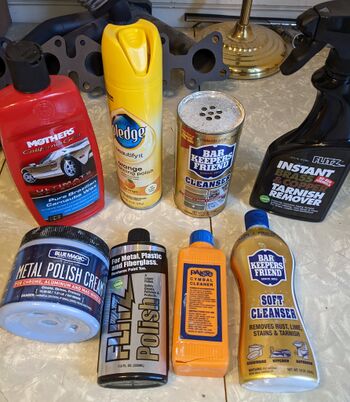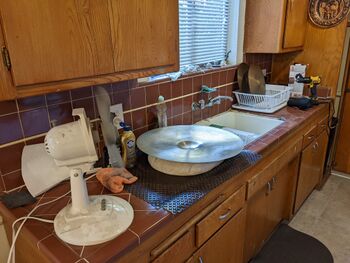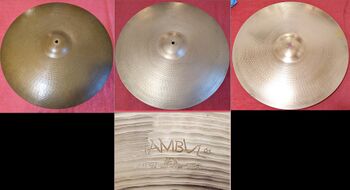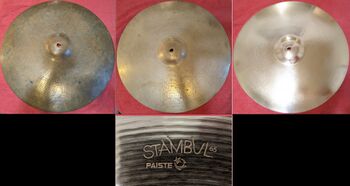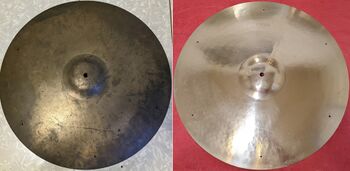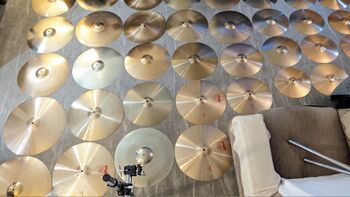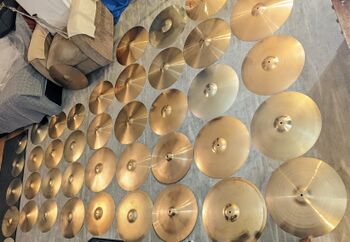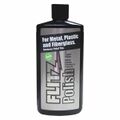Paiste Brass-Tones 20" Power Ride
Wiki cymbal cleaning supplemental
Contents
- 1 Wiki cymbal cleaning supplemental
- 1.1 Soap & water
- 1.2 Cymbal soap:
- 1.3 Flitz spray/tarnish remover:
- 1.4 Blue magic:
- 1.5 Flitz paste
- 1.6 Paiste cymbal cleaner
- 1.7 Mr. Muscle/stahl fix
- 1.8 Barkeeper's soft cleanser
- 1.9 Barkeeper's dry cleanser
- 1.10 Paiste cymbal protector
- 1.11 The Last coat
- 1.12 Pearl drum & cymbal polish
- 1.13 Pure (no cleaner) Carnauba wax
- 1.14 Lemon pledge
- 1.15 Klasse all in one
- 1.16 Klasse high gloss sealant glaze
- 1.17 ProtectaClear
My journey to find the perfect cymbal cleaner!
Tarnish, corrosion, oxidation... what is it and how does it happen and more importantly, how do you get rid of it? A little chemistry 1st!
"Copper does not react with water, but it does slowly react with atmospheric oxygen to form a layer of brown-black copper oxide which, unlike the rust that forms on iron in moist air, protects the underlying metal from further corrosion (passivation). A green layer of verdigris (copper carbonate) can often be seen on old copper structures, such as the roofing of many older buildings and the Statue of Liberty. Copper tarnishes when exposed to some sulfur compounds, with which it reacts to form various copper sulfides."
"Tin resists corrosion from water, but can be corroded by acids and alkalis. Tin can be highly polished and is used as a protective coat for other metals, a protective oxide (passivation) layer prevents further oxidation"
Cleaning experience attained over decades of cleaning cymbals:
I have been using and cleaning Paiste cymbals since 1980. Since day one, I have strived to find the perfect cleaner that won't remove the clear coat or labels from the cymbal but will clean off fingerprints and oxidation.
From my experience of owning both B8 and B20 cymbals, I have found that B8 cymbals tend to oxidize/tarnish very quickly (it's assumed this is from the high copper to tin ratio) if they are not coated or if the clear coat has been worn off, this can happen in a matter of hours (see pictures below).
I speculate that when Paiste first produced their B8 cymbals in the mid 1960s, they realized they would have to coat them in order to keep them from tarnishing and oxidizing. There was no way they would be able to sell new cymbals with the change in color and fingerprints on them. I believe this is when they started applying a clear coating on their new B8 symbols and soon after, also applied it to the Formula 602 B20 cymbals.
The salt and sweat, from your fingers tends to be mildly corrosive to the alloy, especially B8, this tends to work its way through the clear coat and start to eat away or oxidize the copper in the alloy in severe cases if left in that condition of years. When the oxidation is removed (usually by a mild acid in the cleaner), material has been removed as well, it has oxidized and is no longer pure copper. You see the same effect but on a much larger scale when rust has been removed from steel and the pitting is revealed. On Cymbals what you have left is a smooth matte finish, not shiny, but rather dull looking.
When a polish is applied, you can bring back the shine of the cymbal, but it will never attain the original texture/finish because material was removed from the oxidation process changing the surface texture, the symbol will have more of a "brilliant" polished finish (see pictures below).
To clean or not to clean, that is the question!
Here's my experience with several different cleaners i have used and tested, I put them in order of most gentle to most abrasive, I have also added a rating for each cleaner and each coding or protector for their effectiveness:
Soap & water
If it's relatively new, soap (dish detergent), water and a VERY soft scrubbing pad made from plastic, NOT copper or metal! You need to get the salt, oil and dirt from your fingers off of the cymbal so it doesn't start to corrode the bronze.
Cymbal soap:
Flitz spray/tarnish remover:
Flitz tarnish remover spray will get rid of the green tarnish/oxidation in seconds, the drawback is it will leave the alloy "bare/exposed" and ready to oxidize/tarnish immediately. Because of all the copper, B8 cymbals tend to be very susceptible to this (see picture below), they must be coated right away, b20 cymbals are much less prone to this.
Blue magic:
Smelly and messy but easy on ink labels but will take them off if rubbed long and hard enough! is the mildest, smelly from the ammonia but is the most gentle on labels and clear coating.
Flitz paste
Good all around cleaner has tarnish remover chemicals in it, not nearly as messy as blue magic, will remove clear coat and labels if rubbed hard and long enough.
Paiste cymbal cleaner
has tarnish remover chemicals in it, will remove clear coat and labels if rubbed hard and long enough.
Mr. Muscle/stahl fix
Paiste cleaner in the original bottle**! Has tarnish remover chemicals in it, will remove clear coat and labels if rubbed hard and long enough.
- My source was at the factory about 20+ years ago and saw the techs pouring Stahl fix from a large bulk container into the orange Paiste cymbal cleaner bottles, you can't get much more confirmation than that!
The formula did change around that time as well, another German friend has some of the last Paiste cleaner and he says the "smell" changed from the old 1990's cleaner but does smell like the current Mr. Muscle. Possibly this is when SC Johnson bought them out and changed the name to "Mr. Muscle" (see the two pictures above)? What I can also tell you is the cleaner contains a mild acid to break down the oxidation/tarnish, you can see it work as you apply it to the cymbal, the color changes. Barkeeper's soft cleanser has oxalic acid and is much stronger that the acid in Mr. Muscle.
Ingredients for Mr. Muscle, aluminum oxide is the abrasive and there's a couple of different acids in it:
Barkeeper's soft cleanser
has tarnish remover chemicals in it, works well with really dirty cymbals, say goodbye to your clear coat and labels! it has oxalic acid which is great at removing tarnish and green corrosion from salty finger prints (see below), I only use it for the dirtiest cymbals that don't have a clear coat or label!
Barkeeper's dry cleanser
for the filthiest nastiest, grungiest, detritus covered cymbals on the planet!
I also wash with soap (dish detergent), water and a paper towel after each cleaning to get the residue off before coating.
Sealers protective coatings
Paiste cymbal protector
The Last coat
Pearl drum & cymbal polish
Pure (no cleaner) Carnauba wax
creates protective layer if the clear coat is gone, requires lots of rubbing to get it to shine
Lemon pledge
creates protective layer if the clear coat is gone, not as effective as Carnauba wax.
Klasse all in one
Klasse high gloss sealant glaze
ProtectaClear
Oil based clear lacquer
Return to the Main Page
Return to the Paiste Series Portal
Return to the Paiste Cymbal Type Portal

